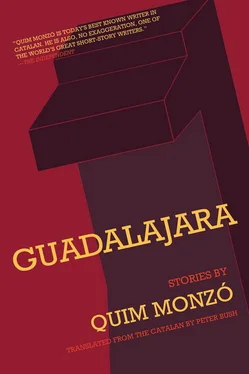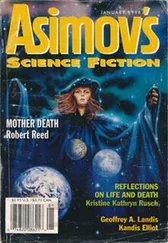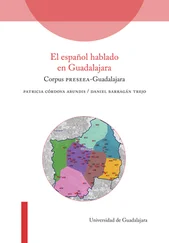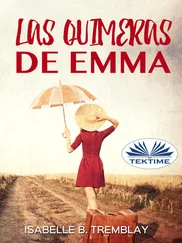Quim Monzó - Guadalajara
Здесь есть возможность читать онлайн «Quim Monzó - Guadalajara» весь текст электронной книги совершенно бесплатно (целиком полную версию без сокращений). В некоторых случаях можно слушать аудио, скачать через торрент в формате fb2 и присутствует краткое содержание. Год выпуска: 2011, Издательство: Open Letter, Жанр: Современная проза, на английском языке. Описание произведения, (предисловие) а так же отзывы посетителей доступны на портале библиотеки ЛибКат.
- Название:Guadalajara
- Автор:
- Издательство:Open Letter
- Жанр:
- Год:2011
- ISBN:нет данных
- Рейтинг книги:3 / 5. Голосов: 1
-
Избранное:Добавить в избранное
- Отзывы:
-
Ваша оценка:
- 60
- 1
- 2
- 3
- 4
- 5
Guadalajara: краткое содержание, описание и аннотация
Предлагаем к чтению аннотацию, описание, краткое содержание или предисловие (зависит от того, что написал сам автор книги «Guadalajara»). Если вы не нашли необходимую информацию о книге — напишите в комментариях, мы постараемся отыскать её.
Guadalajara — читать онлайн бесплатно полную книгу (весь текст) целиком
Ниже представлен текст книги, разбитый по страницам. Система сохранения места последней прочитанной страницы, позволяет с удобством читать онлайн бесплатно книгу «Guadalajara», без необходимости каждый раз заново искать на чём Вы остановились. Поставьте закладку, и сможете в любой момент перейти на страницу, на которой закончили чтение.
Интервал:
Закладка:
Calm in the night. Carousing in bars, the early morning din of the trash collectors. At half past six the shutters at the kiosks started going up. At 10:00 a.m. (barely twenty-four hours after this had all begun!), the first cannonades were heard. Twenty-one, to be precise. There we go. The engaged citizens immediately went out into the street; some sought shelter in the nearest subway stations, mingling with less conscious citizens who were apparently continuing their normal daily lives. After the twenty-one cannonades, silence. The midday television news reported that the prime minister of an economic, political, and military power of the highest level had arrived in the city that morning. This visit provoked contrary opinions among the aware citizenry. Some believed the visit was an excuse to cover up the cannonades they had heard that morning (on the pretext that they were in his honor). Others reckoned the visit wasn’t gratuitous or innocent (nothing is, never ever) and that the great power was attempting either to mediate in the conflict (sheer effrontery) or help one side (absolutely intolerable interference, whichever side they were trying to help). In the afternoon, the first casualties were announced: a five-a-side rugby game in the Olympic Stadium ended with seven injured when supporters of both sides fought a pitched battle on the terraces. Shortly afterwards, it was evening, anguish, and nighttime. The pattern was repeated, day after day, for weeks, with small variations that introduced fresh doubts, fresh evidence, and fresh uncertainties. The drama didn’t lie in the number of deaths (so well concealed as to seem non-existent), the distraught families (these were few in number, prompted by motives unrelated to the conflict), the homes abandoned, or hunger (these had been a factor for years) as much as in the withholding of breath, the wild hypothesizing, and the futile attempts to find out what was really happening. They spent months weighing up new hypotheses and finally found themselves back where they had started: awash in what they themselves ironically dubbed a sea of disinformation. And not the slightest expression of solidarity from any other country, far or near. They found this cold-shouldering by the outside world even more depressing.
Would that war last forever? There’d been one that had even lasted a hundred years that the history books still debated with a sickening indifference. They needed another ninety-eight to equal that war. Humanity’s ability to adapt is admirable. Faced by these rather bleak prospects, parents opted to enlighten their offspring and prepare them for life in such conditions. Generation followed generation, and the parents of the engaged citizenry passed the arguments that were necessary for survival in that unending war on to their children, the first being to keep quiet and adopt an outlook of complete indifference, like every other citizen.
Until, one day when the younger element among the aware citizenry couldn’t agree which year everything had begun (obviously encyclopedias and history books were silent on the matter and portrayed those years as a period of peace and splendor). There was one particularly independent, iconoclastic youth who kicked open the door of the cafeteria, where they met each Tuesday and Thursday to find out about the latest state of play, walked to the table where they were all prevaricating, and told them the news: the war had finished as unexpectedly as it had begun—that afternoon at 5:34. The most cheerful, ingenuous citizens gave a sigh of relief, but the most aware of the aware lowered their heads in sorrow. Because, if a war is hard enough, the post-war period that inevitably follows is even harder and that peace (signed in unimaginable conditions with unimaginable burdens for the citizenry that the media obsessively concealed) was an ineluctable indicator that the post-war period had started.
Books
There are four books on the passionate reader’s table. All waiting to be read. He went to the bookshop this afternoon, and after spending an hour around the new releases tables and reviewing the covers of his favorite authors on the shelves, he chose four. One is a book of short stories by a French writer; he really enjoyed a novel of his years ago. He didn’t like the second novel he published that much (in fact, didn’t like it all) and has now bought this book of stories in the hope of re-discovering what had fired his imagination so many years ago. The second book is a novel by a Dutch writer whose two preceding novels he had tried to read, but with little success, because he’d had to put both of them down after a few lines. Strangely, this didn’t lead him to abandon the idea of a fresh attempt. Strangely, because usually, when he can’t stand twenty lines of the first book by a particular writer, he might try the second but never the third, unless the critics he trusts have singled it out for special praise, or a friend has recommended it particularly enthusiastically. But this wasn’t the case now. Why did he decide to give him another try? Perhaps it’s the beginning. The beginning that goes: “The bellhop rushed in shouting: “Mr. Kington! Mr. Kington, please!” Mr. Kington was reading the newspaper in the lobby of the Ambassade Hotel and was about to raise his hand when he realized that nobody, but nobody, knew he was there. He didn’t even look up when the bellhop walked by. It would be the most intelligent decision he had ever taken.”
The third book is also a novel, the first novel by an American author he has never heard of. He bought it because in spite of the initial quotation (“Oh, how the tiles glinted in the blossoming dawn, when the roosters’ cry broke the silence with the sound . . .”) he had leafed through it and felt drawn in. The fourth book is a book of short stories, also by a Dutch writer, one who had been unpublished to that point. What attracted him to that book? If he were to be sincere, it was the rich abundance of initials: there are three (A., F., Th.) before the three words that make up the surname. A total of six words: three for the surname and three for the forename. What’s more, the first word of the surname is “van.” He simply adores surnames that begin with “van.”
Why, out of the four books that the passionate reader has on his table, are two (50% exactly) Dutch? Because the Book Fair held in the city was this year devoted to Dutch literature, and that meant, on the one hand, that publishers have brought out more writers in that language recently and, on the other, that the main bookshops in the city have created special displays, piling tables up with these new books as well as books by Dutch and Flemish authors that had been published years ago, that are no longer new and were gathering dust in the distributors’ warehouses.
The passionate reader has all four books in front of him and can’t think where to begin. The stories by the French writer whose novel he liked several years ago? The novel by the young American about whom he knows nothing? That way, if (as is very likely) he finds it immediately disappointing, he will have eliminated one of the four at a stroke and will only have to choose from among the other three. Obviously the same may happen with the novel by the Dutch writer whom he has had to put down on two previous occasions, after merely one page. The reader opens the second book and leafs through. He opens the third and does exactly the same. And follows suit with the fourth. He could choose on the basis of the typeface or kind of paper . . . He tries to find another aspect of the books that could decide for him (an isolated sentence, a character’s name). Page layout. Or paragraphing, for example. He knows that many writers struggle to create frequent paragraphs, whether the text calls for it or not, because they think that when the reader sees the page isn’t too dense, he will feel better disposed toward the book. The same goes for dialogue. A serrated text, with lots of dialogue, is (according to current norms) a plus for most people. This may generally be the case, but has the opposite effect on this reader: he finds an abundance of new paragraphs irritating. He is prejudiced against, and mirrors the prejudice felt by lovers of abundant paragraphs, who find a lack of paragraphs extremely monotonous or arrogant.
Читать дальшеИнтервал:
Закладка:
Похожие книги на «Guadalajara»
Представляем Вашему вниманию похожие книги на «Guadalajara» списком для выбора. Мы отобрали схожую по названию и смыслу литературу в надежде предоставить читателям больше вариантов отыскать новые, интересные, ещё непрочитанные произведения.
Обсуждение, отзывы о книге «Guadalajara» и просто собственные мнения читателей. Оставьте ваши комментарии, напишите, что Вы думаете о произведении, его смысле или главных героях. Укажите что конкретно понравилось, а что нет, и почему Вы так считаете.












